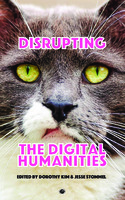Disrupting the Digital Humanities
Contributor(s)
Kim, Dorothy (editor)
Stommel, Jesse (editor)
Collection
ScholarLedLanguage
EnglishAbstract
All too often, defining a discipline becomes more an exercise of exclusion than inclusion. Disrupting the Digital Humanities seeks to rethink how we map disciplinary terrain by directly confronting the gatekeeping impulse of many other so-called field-defining collections. What is most beautiful about the work of the Digital Humanities is exactly the fact that it can’t be tidily anthologized. In fact, the desire to neatly define the Digital Humanities (to filter the DH-y from the DH) is a way of excluding the radically diverse work that actually constitutes the field. This collection, then, works to push and prod at the edges of the Digital Humanities — to open the Digital Humanities rather than close it down. Ultimately, it’s exactly the fringes, the outliers, that make the Digital Humanities both heterogeneous and rigorous. This collection does not constitute yet another reservoir for the new Digital Humanities canon. Rather, its aim is less about assembling content as it is about creating new conversations. Building a truly communal space for the digital humanities requires that we all approach that space with a commitment to: 1) creating open and non-hierarchical dialogues; 2) championing non-traditional work that might not otherwise be recognized through conventional scholarly channels; 3) amplifying marginalized voices; 4) advocating for students and learners; and 5) sharing generously and openly to support the work of our peers.
Keywords
disrupting; digital humanitiesDOI
10.21983/P3.0230.1.00ISBN
9781947447721, 9781947447714OCN
1100528099Publisher
punctum booksPublisher website
https://punctumbooks.com/Publication date and place
Brooklyn, NY, 2018Classification
History


 Download
Download